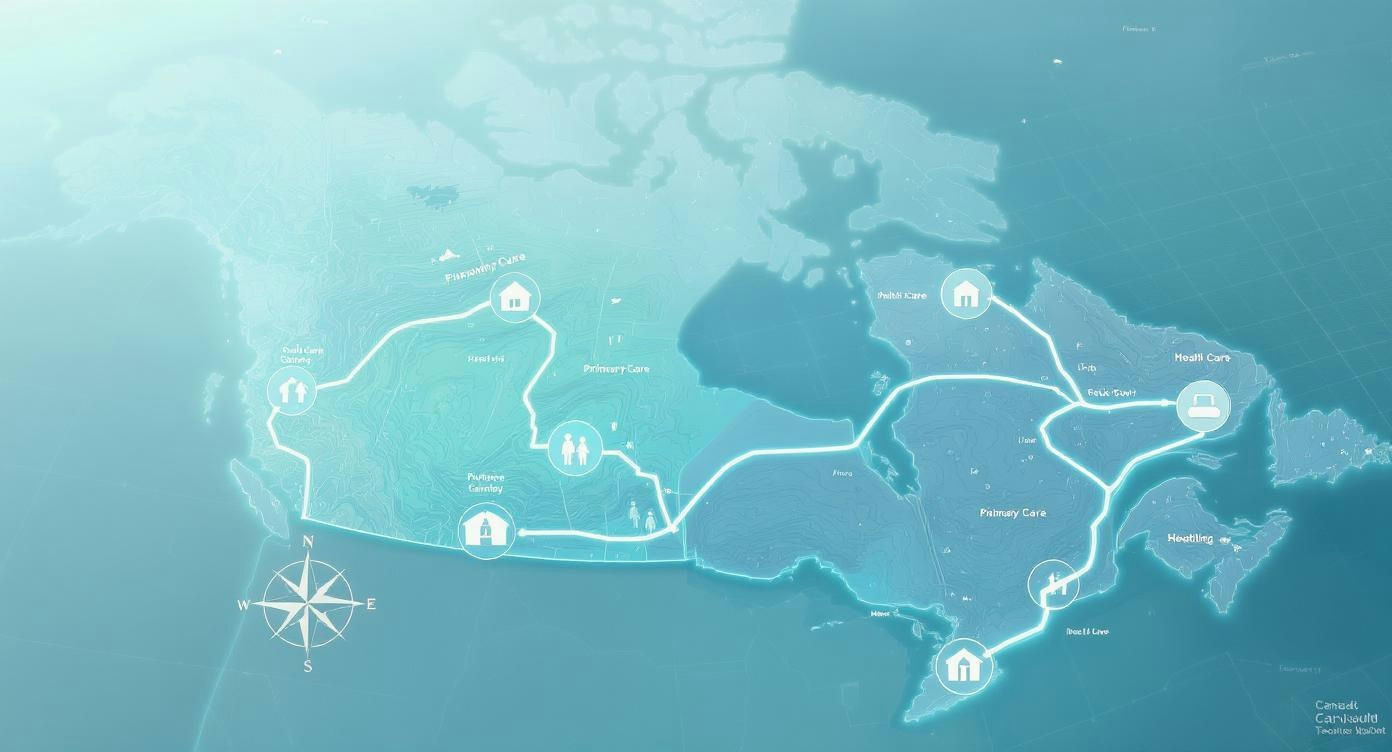Navigating Healthcare for Newcomers: Your Complete Guide to the Canadian Medical System
Navigating Healthcare for Newcomers: Your Complete Guide to the Canadian Medical System
Executive Summary
This comprehensive guide helps newcomers to Canada navigate the healthcare system, covering everything from obtaining health insurance to finding primary care providers and understanding what services are covered. Learn about healthcare options during the OHIP waiting period, how to access various medical services, and practical steps for managing your family’s health in your new home.
Table of Contents
- Welcome to Canada’s Healthcare Landscape
- Understanding Canadian Healthcare: The Basics
- Getting Started: Essential First Steps for Newcomers
- Accessing Different Types of Healthcare Services
- Understanding Healthcare Costs
- Navigating Healthcare Challenges Unique to Newcomers
- Digital Health Resources for Newcomers
- Accessing Care Through Alternative Models
- Preventive Care: A Canadian Healthcare Priority
- Building a Healthcare Team for Your Family
- Planning for Healthcare Success in Your New Home
- How Care& Family Health Supports Newcomers
- FAQ: Common Questions from Newcomers
Welcome to Canada’s Healthcare Landscape
Moving to a new country brings countless adjustments, and few are as important as understanding how to access healthcare in your new home. For newcomers to Canada, navigating the medical system can feel overwhelming at first. From health cards to finding a primary care provider, the Canadian healthcare system has its own unique structure that differs significantly from many other countries.
At Care& Family Health, we regularly support newcomers as they transition to life in Toronto and learn to navigate the Canadian healthcare system. This comprehensive guide will walk you through everything you need to know—from understanding how universal healthcare works to practical steps for accessing timely medical care when you need it.
Understanding Canadian Healthcare: The Basics
Canada’s healthcare system operates under a publicly funded model often referred to as “Medicare.” This system provides essential medical services to Canadian citizens and permanent residents through provincial health insurance plans.
Public vs. Private Healthcare in Canada
The Canadian healthcare system is predominantly public, with essential medical services covered by provincial health plans. However, it’s important to understand that the system is actually a blend:
- Public coverage: Hospital care, physician services, and some diagnostic testing
- Private coverage: Prescription medications (outside hospitals), dental care, vision care, physiotherapy, and many other services
Many Canadians supplement the public system with private insurance plans, often obtained through employers, to cover services not included in provincial plans.
Provincial Differences: Ontario’s Healthcare System
Healthcare in Canada is administered at the provincial level, meaning each province has its own health insurance plan with slight variations in coverage and administration.
In Ontario, the provincial plan is the Ontario Health Insurance Plan (OHIP). For newcomers to Toronto, understanding OHIP is your first step in accessing healthcare services.
Getting Started: Essential First Steps for Newcomers
1. Apply for Provincial Health Insurance (OHIP)
As a newcomer to Ontario, applying for OHIP should be one of your first priorities. Most permanent residents and work permit holders are eligible for OHIP, but there are important details to know:
- Waiting period: Most newcomers face a 3-month waiting period before OHIP coverage begins
- Required documents: You’ll need your immigration documents, proof of Ontario residency, and government-issued identification
- Where to apply: Visit a ServiceOntario centre in person (bring original documents)
During the waiting period:
Consider purchasing private health insurance to cover you until your OHIP becomes active. Several insurance companies offer newcomer packages specifically designed for this gap period.
2. Obtain Your Health Card
Once approved for OHIP, you’ll receive your Ontario Health Card. This card is your key to accessing publicly funded healthcare services. Always carry it with you when seeking medical care, as you’ll need to present it at hospitals, medical clinics, and other healthcare facilities.
3. Find a Primary Healthcare Provider
One of the most significant challenges newcomers face is finding a primary healthcare provider. In Canada’s healthcare model, your primary provider is your main point of contact for non-emergency health concerns and coordinates your overall healthcare.
The two most common primary care options in Ontario are:
- Family doctors: Physicians who provide ongoing, comprehensive care
- Nurse Practitioners: Advanced practice nurses who can diagnose, treat, prescribe medications, and provide comprehensive primary care similar to family doctors
Finding a family doctor accepting new patients in Toronto can be challenging due to the shortage of primary care physicians. This is where alternative models like Nurse Practitioner-led clinics offer valuable options for newcomers seeking timely, comprehensive care.
Need a Primary Care Provider?
Care& Family Health offers Nurse Practitioner-led primary care with same or next-day appointments. Our team is accepting new patients and can provide comprehensive care while you settle into your new life in Canada.
Accessing Different Types of Healthcare Services
Primary Care Options
Primary care is your first point of contact with the healthcare system for non-emergency situations. Options include:
Emergency and Urgent Care
Understanding when and where to seek emergency care is crucial:
Specialized Care and Referrals
In Canada’s healthcare system, access to specialists typically requires a referral from your primary care provider. This “gatekeeper” approach helps ensure appropriate use of specialized services, but means you need a primary provider to coordinate your care.
Understanding Healthcare Costs: What’s Covered and What’s Not
OHIP-Covered Services
With your Ontario Health Card, these services are covered:
- Doctor visits
- Hospital care
- Many diagnostic tests
- Emergency services
Services Not Covered by OHIP
Be prepared to pay out-of-pocket or through private insurance for:
- Prescription medications (outside hospitals)
- Dental care
- Vision care (except annual eye exams for those under 20 or over 65)
- Physiotherapy (except in specific circumstances)
- Mental health services from non-physician providers
- Ambulance services (a co-payment may apply)
Private Insurance Options
Many newcomers obtain additional coverage through:
- Employer benefits packages
- University/college health plans for students
- Private insurance plans specifically designed for newcomers
Transparent Pricing at Care& Family Health
We offer clear pricing for both OHIP-covered and uninsured services, ensuring newcomers can access care during their waiting period.
Navigating Healthcare Challenges Unique to Newcomers
Language Barriers
If English is not your first language:
- Request interpretation services when scheduling appointments
- Some medical clinics in Toronto offer services in multiple languages
- Bring a trusted friend or family member to appointments if needed
- Look for healthcare providers who speak your language
Cultural Differences in Healthcare
The Canadian approach to healthcare may differ from what you’re accustomed to:
- Canadian healthcare emphasizes patient autonomy and informed consent
- Preventive care is highly valued
- Patient-provider relationships tend to be collaborative rather than authoritative
- Mental health is viewed as an essential component of overall health
Managing Pre-existing Conditions
If you have ongoing health concerns:
- Bring medical records from your home country (translated if possible)
- Make finding a primary care provider a top priority
- Create a list of your medications, including generic names
- Research whether your medications are available in Canada and covered by insurance
Care& Supports Newcomers
Our medical clinic is designed to meet the unique needs of Toronto’s diverse communities with unrushed appointments that allow time to discuss cultural considerations and complex health histories.
Digital Health Resources for Newcomers
Canada’s healthcare system is increasingly embracing digital solutions:
Care& App: Healthcare in Your Pocket
Our app puts healthcare at your fingertips with features designed for newcomers:
- Book appointments online
- Access your health records
- Secure messaging with your healthcare team
- Track medications and health metrics
Practical Steps for Accessing Care Through Alternative Models
Finding a family doctor accepting new patients in Toronto can be challenging. Here are practical alternatives for newcomers:
Ready to Establish Healthcare in Toronto?
Care& Family Health offers all the alternative care options mentioned above, providing a comprehensive solution for newcomers seeking reliable, accessible healthcare.
Preventive Care: A Canadian Healthcare Priority
The Canadian healthcare system emphasizes preventive care and health maintenance:
Track Your Preventive Care
The Care& app helps you stay on top of recommended screenings, immunizations, and check-ups with personalized reminders and a comprehensive health record feature.
Building a Healthcare Team for Your Family
Pediatric Care for Children
For families with children:
- Children should be registered for OHIP
- Find a healthcare provider comfortable with pediatric care
- Schedule regular well-child visits
- Ensure immunizations are up-to-date according to Ontario’s schedule
Women’s Health Services
For women, consider establishing care with providers who offer:
- Preventive screenings
- Pregnancy planning/care if relevant
- Menopause management
- Sexual health services
Men’s Health Considerations
Men’s health services focus on:
- Age-appropriate screenings
- Heart health
- Prostate health
- Sexual health
Mental Health Support
Adjusting to life in a new country can be stressful. Mental health resources include:
- Primary care providers who can address anxiety and depression
- Community mental health organizations
- Cultural-specific support groups
- Online mental health resources
Family Care at Care&
Our team provides comprehensive care for all family members, including pediatric care, women’s health, men’s health, and mental health support all in one convenient medical clinic.
Planning for Healthcare Success in Your New Home
Create a Health Information File
Organize your health information in one place:
- Copies of health cards for family members
- List of medications and allergies
- Emergency contacts
- Primary care provider information
- Medical history documents
Learn the Healthcare Vocabulary
Familiarize yourself with common Canadian healthcare terms:
- OHIP (Ontario Health Insurance Plan)
- Referral
- Specialist
- Prescription
- Dispensing fee
- Deductible
- Co-payment
Know Your Rights as a Patient
In Canada, you have the right to:
- Informed consent before treatment
- Confidentiality
- Access your medical records
- Receive care without discrimination
- Refuse treatment
- Seek a second opinion
How Care& Family Health Supports Newcomers
At Care& Family Health, we understand the unique challenges newcomers face when navigating healthcare in Toronto. Our approach is designed to address these challenges through:
Quick access to primary care
Our Nurse Practitioners are accepting new patients, providing an alternative to the long wait for family doctors accepting new patients







